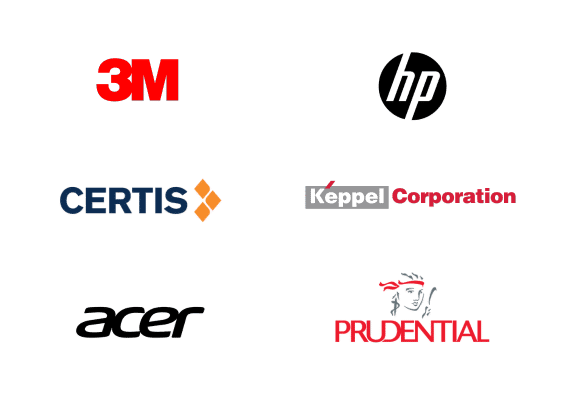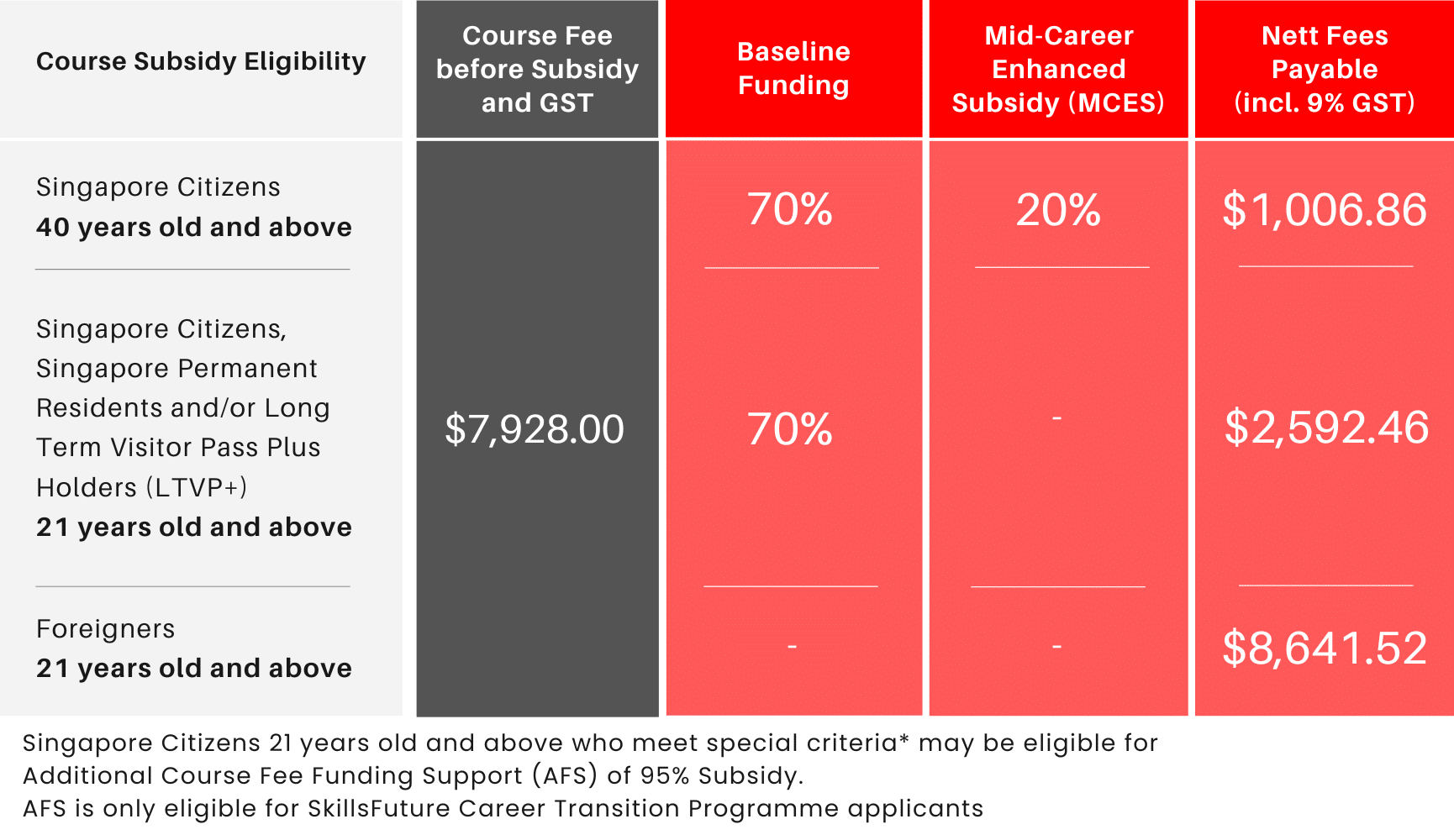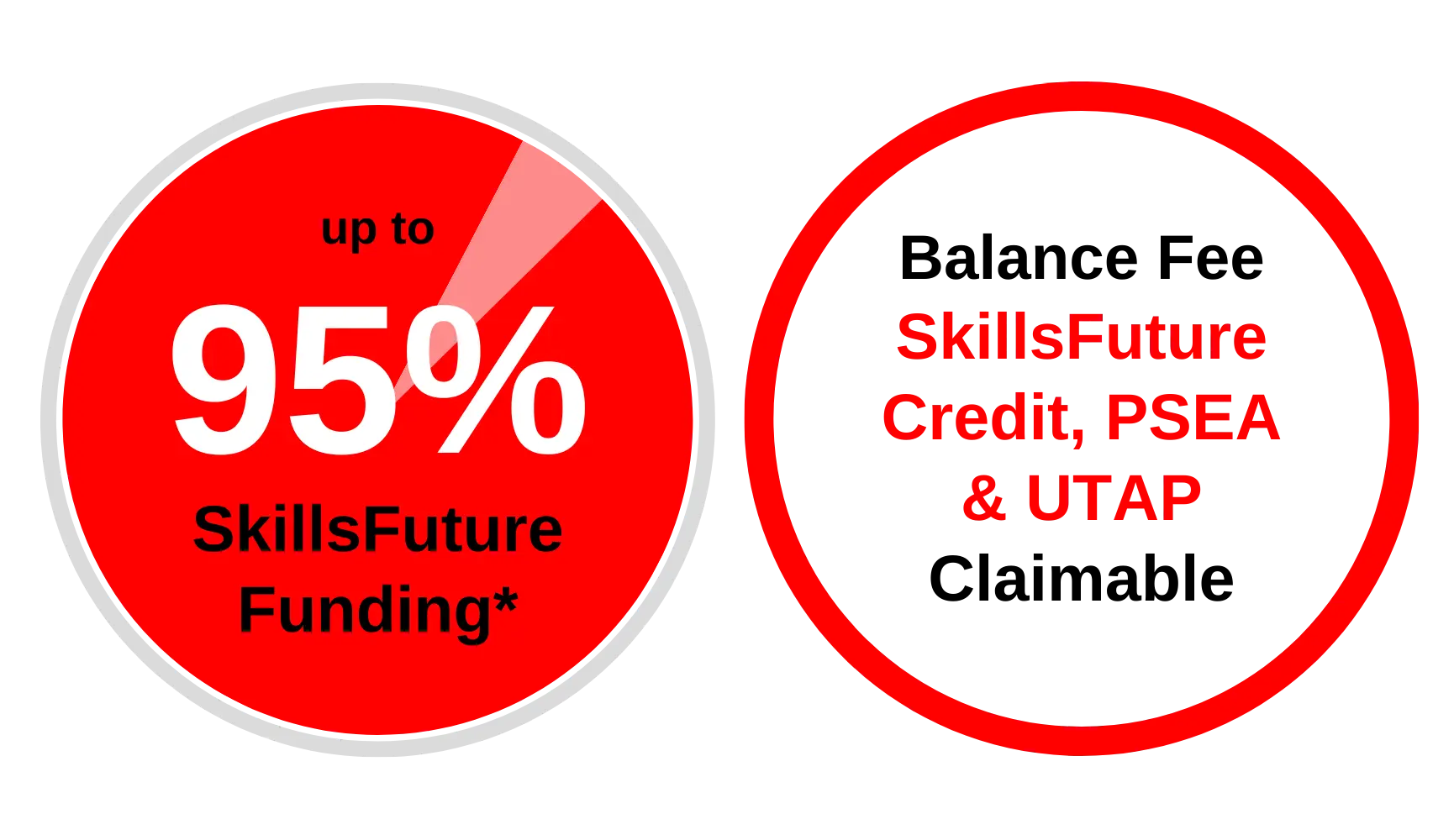WHY TAKE @ASK TRAINING'S DIPLOMA PROGRAMME
When you learn with us, you will get certified by a recognised certification body, the Singapore Workforce Skills Qualifications (WSQ). On top of that, you will also acquire extensive knowledge from highly experienced industry practitioners in Singapore who develop and deliver top quality course content through experiential hands-on learning methodologies.
-
Industry-recognised WSQ Statement of Attainments
-
Real-world hands-on projects
-
Comprehensive, up-to-date curriculum and courseware
-
Post-course coaching and mentorship
-
Career advisory and resources support
Our Clients



Thank You For Downloading The Diploma in Digital Marketing Brochure
Have Any Questions?
Submit the form below and our programme consultants will get back to you shortly.
"*" indicates required fields
Earn Your WSQ Diploma in Digital Marketing
Are you a Career Seeker, Business Owner, or a Marketer?
CAREER SEEKER

According to Coursera’s The Job Skills of 2024 report, digital marketing skills are among the fastest-growing business skills.
Entry-level digital marketing roles start around SGD 30,000 per year, with experienced positions like Digital Marketing Managers earning SGD 54,000 to SGD 110,000 annually. Sources: Marketing Interactive, Glassdoor
However, breaking into the digital marketing field can be challenging as employers seek candidates with a diverse skill set and comprehensive portfolios.
In this digital marketing diploma programme, you will work on real-world projects, gaining the experience that employers value.
Experienced mentors will guide you through your capstone project with our industry partners, providing first-hand experience working with clients and helping you build a strong portfolio.
BUSINESS OWNER

Understanding digital marketing is crucial for business owners to effectively manage their teams and drive growth.
Navigating the complexities of hiring, managing, and retaining digital marketing talent, along with managing your marketing budget and business ROI, can be particularly challenging.
Completing the 7 digital marketing modules in this Digital Marketing Diploma programme equips you with the skills to execute campaigns independently or manage your team more effectively.
This programme enables you to streamline your operations and empowers you to provide strong leadership and support to your employees, ensuring your business thrives in the digital space.
MARKETER

With the rapid advancement of technology and ongoing digital transformation, the digital skills gap is widening. Emerging platforms, tools, and strategies create a challenging environment for marketing professionals to stay current and effective.
Marketers today must master diverse digital marketing skills while demonstrating a clear return on investment (ROI) for their efforts. This pressure to adapt quickly shows the critical need for continuous learning and professional development in digital marketing.
This comprehensive Diploma in Digital Marketing programme will enhance your skillset and bolster your resume with essential, industry-relevant expertise.
These skills will enable you to significantly improve marketing conversion rates and achieve a higher return on investment, ultimately boosting both your professional profile and your organisation’s success.
What is the SkillsFuture Career Transition Programme (SCTP)?
The SkillsFuture Career Transition Programme (SCTP) is a government initiative in Singapore designed to assist mid-career individuals in acquiring new skills and knowledge to facilitate a career transition. This programme is geared towards individuals who wish to switch industries or occupations due to changes in the job market, technological advancements, or personal career goals.
Here are some key features and components of the SkillsFuture Career Transition Programme:
Career Guidance: The programme also provides career advisory services and guidance to help individuals get placed in job roles, such as interview preparation, resume tips and more.
Discover Your Path: SCTP vs. Non-SCTP
SCTP Pathway
For those aspiring to kickstart a career in digital marketing.- Structured Learning: Dive into a comprehensive curriculum, equipping you with the latest industry knowledge and skills.
- Capstone Project: Complete a practical capstone project which serves as a portfolio, guided by our experts. It’s a chance to apply your newfound expertise to real-world scenarios.
- Coaching & mentorship: Benefit from post-course coaching and mentorship, fine-tuning your skills and helping you apply learnings to your project.
- Career Advisory and Resources Support: Our dedicated career services team will provide various assistance and resources to enhance your job search.
Non-SCTP Pathway
For those seeking knowledge without the commitment of a job transition.- Flexible Learning: Access the same six modules + capstone project with comprehensive curriculum, equipping you with the latest industry knowledge and skills but on your schedule. No need to follow set course intake dates; choose the course dates that suit you.
- Independent Journey: As a non-SCTP learner, you won’t receive post-course coaching or mentorship, and we won’t place you in a job. Your focus is solely on learning and applying these skills to real-world scenarios.
- Earn Your Diploma: Upon successful completion, you’ll still earn your accredited Diploma in Digital Marketing, a testament to your expertise in the field.
Course Modules & Curriculum
Need help? Contact us for more info
Digital Marketing Diploma Course Modules & Curriculum
This Diploma in Digital Marketing spans 7 modules (131 hours) over 4 months, depending on whether you’re enrolled in the full-time or part-time intake.
Module 1: WordPress Website Creation
Topics Covered
- Learning Unit 1: WordPress Website Planning and Setup
- Learning Unit 2: Development and Digital Marketing Integration
- Learning Unit 3: Design Documentation – WordPress Website
Hands-on Project-based Assignment
At the end of the module, the trainees should be able to demonstrate proficiency in creating WordPress website design blueprint and customisation, including defining the project’s scope and user needs, selecting and applying design standards and tools, customising a theme, integrating digital marketing functionalities, and producing comprehensive design documentation that outlines the project’s design concept, specifications, and structure, ensuring a cohesive approach to website development and digital marketing strategy.
Learning Outcomes
- Create a WordPress Website design blueprint that meets the business and user requirements.
- Review and recommend appropriate standards, methods and tools for the design of WordPress website, in line with the organisation’s practice and design principles.
- Customise a WordPress theme, including configuring plugins for digital marketing addressing the business and user needs.
- Examine the trade-offs resulting from the integration of different elements into the design and analyse how these trade-offs influence the overall functionality, interoperability, efficiency, and costs of WordPress website creation.
- Plan, document, and communicate the design and functionality effectively, aligning with the project’s goals and audience needs.
Module 2: Digital Content Creation
Topics Covered
- Learning Unit 1: Content Management Strategies & Content Management System
- Learning Unit 2: Digital Content Strategy and Planning
- Learning Unit 3: Content Creation and Optimisation
- Learning Unit 4: Advanced Techniques and Trends
Hands-on Project-based Assignment
At the end of the module, the trainees should be able to develop and execute a digital content strategy that includes analysis, planning, and execution phases. The strategy should focus on content creation, SEO optimisation, and promotion across social media and email marketing to effectively engage a targeted audience.
Learning Outcomes
- Transform an overall content management strategy into policies on web content creation and curation, breaking down the strategy into specific guidelines and rules that govern how content is created, curated, and managed on the web.
- Develop a web content strategy for an organisation, including defining target audiences, setting clear goals, planning content creation, and evaluating content management system options, considering cost, scalability, user-friendliness, and integration capabilities.
- Create and optimise various forms of digital content, including written, multimedia, and interactive content, adhering to best practices for search engine optimisation (SEO), user experience (UX) design, and accessibility to enhance the visibility, engagement, and effectiveness of web content for their target audience.
- Assess emerging tools and techniques, including applying them to enhance user engagement and adapt to evolving user behaviours in their content creation and management efforts.
Module 3: Copywriting & Content Writing
Topics Covered
- Learning Unit 1: Contents – The Foundation to Digital Marketing
- Learning Unit 2: Principles of Digital Storytelling
- Learning Unit 3: Evolving Preference in Contents
- Learning Unit 4: Conceptualising Content Ideas
- Learning Unit 5: Identifying Content Requirements
- Learning Unit 6: The Digital Storyboard Process
- Learning Unit 7: Parameters of Delivering Content
- Learning Unit 8: Features of Marketing Content
- Learning Unit 9: Modes of Content Delivery
- Learning Unit 10: Mapping Digital Storyboard
- Learning Unit 11: Frequency of Delivering Content
- Learning Unit 12: Determine Content Types and Styles
- Learning Unit 13: Modes and Processes for Distributing Contents
- Learning Unit 14: Guidelines for Content Strategy Execution
- Learning Unit 15: Concept of copywriting and content writing in digital marketing
- Learning Unit 16: SEO in Copywriting and Content Writing
- Learning Unit 17: The Role of Content in SEO
- Learning Unit 18: Ethical Considerations and Copywriting Law
Hands-on Project-based Assignment
At the end of the module, the trainees should be able to demonstrate their ability to choose products or campaigns that meet digital marketing goals, craft diverse marketing content for a defined audience, design digital storyboards for strategic planning, set content delivery schedules and formats to boost engagement, select appropriate distribution channels, and create guidelines to ensure brand consistency, content quality, performance tracking, and effective team collaboration.
Learning Outcomes
- Apply the principles of digital storytelling to conceptualise and create content ideas that effectively meet marketing objectives, engaging audiences and driving desired actions in the online landscape.
- Create a digital storyboard as an integral component of a content strategy plan, including applying multichannel content strategies that adhere to the parameters of delivering content for marketing purposes, incorporate the essential features of marketing content, and employ various modes of content delivery to achieve marketing objectives.
Module 4: Google Ads
Topics Covered
- Learning Unit 1: Introduction to Google ads and Strategic Planning
- Learning Unit 2: Google Ads Campaign Setup
- Learning Unit 3: Measuring a Google Ads Campaign
- Learning Unit 4: Testing & Optimisation
Hands-on Project-based Assignment
At the end of the module, the trainees should be able to demonstrate their ability to plan, execute, measure, and optimise a hypothetical Google Ads campaign, including selecting objectives, ad types, targeting, budgeting, creating ads, analysing performance metrics, and conducting experiments to improve the Quality Score.
Learning Outcomes
- Examine the integration of the Google Ads platform within a comprehensive marketing strategy.
- Develop a thorough comprehension of the foundational principles and processes of the Google Ads platform.
- Master the intricacies of Google Ads campaign setup by progressing through each crucial stage to define clear campaign objectives, employ effective bidding strategies, target audiences, conduct strategic keyword research, craft compelling ad copy, explore diverse ad formats, and skillfully manage budgets.
- Develop proficiency in Google Ads by selecting and interpreting relevant metrics to gauge campaign success, including analysing Return on Investment (ROI), reviewing and understanding various attribution models, scrutinising conversion paths, and customising reports to evaluate advertising performance comprehensively.
- Evaluate a Google ads campaign to ensure the activity effectively reaches target markets, aligns with performance measures, and is optimised based on testing, ad relevance, and targeting.
Module 5: Facebook & Instagram Marketing
Topics Covered
- Learning Unit 1: Meta (Facebook and Instagram) Marketing
- Learning Unit 2: Meta Marketing Plan and Ads Campaign
- Learning Unit 3: Launch and Evaluate Meta Ads Campaign
- Learning Unit 4: Crisis Communication Plan
Hands-on Project-based Assignment
At the end of the module, the trainees should be able to demonstrate their ability to plan, create, launch, and evaluate a Meta ad campaign, encompassing setting objectives and target audience, developing and uploading ad creatives, initiating the campaign, and measuring its success through key performance indicators to make data-driven optimisations.
Learning Outcomes
- Utilise media platforms for marketing and media management while aligning platform selection with audience, content, goals, and resources to enhance social media strategy effectiveness.
- Create a comprehensive marketing plan that involves developing and facilitating the content and integration of media platforms for Meta, including defining the activities, timeline targets, and responsibilities.
- Demonstrate proficiency in refining the advertising strategy, optimising ad creatives, and making data-driven decisions for improved campaign results and return on investment.
- Develop crisis communication skills to effectively manage and resolve conflicts and complaints in Meta Ads campaigns.
Module 6: Website and Landing Page Conversion Optimisation
Topics Covered
- Learning Unit 1: Introduction to Conversion Optimisation
- Learning Unit 2: Consumer Psychology and the User Experience
- Learning Unit 3: Fundamentals of Design (UX/UI)
- Learning Unit 4: Effective Content & Messaging
- Learning Unit 5: Optimisation Tools
- Learning Unit 6: Measurement and Reporting
Hands-on Project-based Assignment
At the end of the module, the trainees should be able to demonstrate their ability to optimise website and landing page conversions through assessment, design improvements, content enhancement, technical optimisation, and performance monitoring across five stages, involving SWOT analysis, wireframing, content strategy development, A/B testing, SEO adjustments, and tracking key performance indicators in Google Analytics for ongoing refinement and performance improvement.
Learning Outcomes
- Gain an understanding of the role that websites and landing pages play in the overall marketing mix, including the use of the conversion optimisation framework to gain a deeper analysis and then building out goals for improvement of website and landing page conversion rates.
- Acquire a deep understanding of the user journey and the critical skills for effective website flow analysis.
- Apply the significance of Heuristic analysis for evaluating interfaces highlighting common usage patterns and identifying areas for optimisation.
- Evaluate and reengineer a website or landing page layout, including improving its navigation, visual hierarchy, and mobile responsiveness to enhance user engagement and facilitate a smoother journey towards conversion goals.
- Craft compelling, targeted content strategies that effectively communicate the value proposition, incorporate persuasive copywriting techniques, and integrate social proof to increase the credibility and conversion potential of a website or landing page.
- Integrate ethical psychological triggers and ensure adherence to relevant privacy regulations within digital content, including creating a sense of urgency and trust that complies with legal standards to motivate user action and increase conversion rates effectively.
- Develop and implement a data-driven conversion rate optimisation strategy by utilising A/B testing, SEO best practices, and key performance indicators to systematically enhance website functionality and user experience and ultimately improve conversion rates.
- Assess and select relevant key performance indicators to measure the impact of optimisation techniques to ascertain if the goals have been reached.
- Set up reports to consistently track these metrics and understand how to use this data and develop marketing insights to improve website and landing age performance.
Module 7: Capstone Project (Digital Marketing Campaign)
Overview
The Capstone Project involves crafting a comprehensive Digital Marketing Campaign portfolio for a partner enterprise, detailing a conversion-optimised landing page design, engaging content for both web and social platforms, targeted ad copy for search and display, and meticulously set up Google Ads and social media campaigns.
This includes conducting a SWOT analysis of competitor pages, creating compelling digital content, and evaluating the overall campaign effectiveness using conversion optimisation models, with a focus on aligning the campaign’s purpose, objectives, and execution with the partner enterprise’s specific requirements and goals.
Learning Units
- Scope Digital Marketing Campaign
- Purpose of digital marketing communications campaign plan
- How to set digital marketing campaign objectives, goals, and KPIs
- Examples of various types of digital marketing objectives and SMART goals
- Overview of entire digital marketing campaign plan template
- Create Landing Page
- How to conduct SWOT analysis across competitor websites and landing pages?
- Digital Marketing Analytics Tools and Techniques
- Content Creation for Web & Social
- Examples of various types and formats of engaging content for web and social
- Tutorial and walkthrough of content creation using design tools like Canva.
- Copywriting & Content Writing
- Best practises for Search Ads (Google Search & Display Ads)
- Best practises for Display Ads (Google Display Ads)
- Tutorial and walkthrough of how to produce an SEO-optimised blog article or lead magnet with the assistance of AI tools.
- How to avoid AI tool usage detection?
- Google Ads
- Budget setting
- Scheduling ad campaigns
- Tutorial and walkthrough of setting up a Google Ads Search and Display campaign.
- Facebook & Instagram Marketing
- Budget setting
- Scheduling ad campaigns
- Tutorial and walkthrough of setting up a Facebook and Instagram marketing campaign.
- Website & Landing Page Conversion Optimisation
- Best practises & Heuristic principles of Conversion Rate Optimisation
Learning Outcomes
Upon completion of this course, trainees should be able to develop and execute a digital marketing campaign, including:
- Scope the purpose and objectives of a digital marketing campaign in accordance with a company’s requirements.
- Conduct SWOT analysis on competitor landing pages and create a conversion-focused landing page that stands out from the competition.
- Create highly engaging content for web and social.
- Write an ad copy for search, display, and/or social.
- Produce an SEO-optimised blog article or lead magnet for content marketing.
- Set up a Google Ads Search and Display campaign to market a company’s products and services.
- Set up social media marketing campaigns to drive awareness and conversions for a company’s products and services.
Enrolment Requirements
To enrol in this WSQ DIPLOMA in Infocomm Technology (Sales and Marketing) Programme, you should possess the following:
- 1 GCE ‘O’ level or equivalent (≥ 21 years old); or
- NITEC/Higher NITEC (≥ 21 years old); or
- Mature candidates (≥ 30 years old with 8 years of work experience); or
- Candidates with other qualifications will be considered on a case-by-case basis
You will need basic computer skills. While optional, having a basic understanding of sales and marketing concepts would be beneficial.
Why Take @ASK Training’s Diploma Programme
When you learn with us, you will get certified by a recognised certification body, the Singapore Workforce Skills Qualifications (WSQ). On top of that, you will also acquire extensive knowledge from highly experienced industry practitioners in Singapore who develop and deliver top quality course content through experiential hands-on learning methodologies. What you can expect:
Industry-recognised WSQ Statement of Attainments
Real-world hands-on projects
Comprehensive, up-to-date curriculum and courseware
Post-course coaching and mentorship
Career advisory and resources support
Hear from our Diploma Programme Alumni
"Trainers here are knowledgeable and patient"
Xie Jing Hui, Sole Proprietor, Amazon Products
"The courses here are relevant to what i want to study and the trainers here are very patient and nice"
Marcus Eng, Operation Manager
"Trainers are professional, there's a good mix of students coming from all walks of life"
Philip Lee
"Trainer is very engaging and shares his past experiences and case studies"
Muhammad Aizudyn, Associate Engineer, ST Engineering
Post-Course Support and Outcomes

Upon completing this digital marketing diploma programme, you will receive coaching and mentorship by our programme advisors to complete your capstone project. This capstone project also serves as your portfolio, showcasing your knowledge and skills.
Once the project is completed, you’ll gain access to our dedicated career advisory and resources support. Our career services team will be readily available to provide assistance to enhance your employability, such as Career Assistance Workshops, resume building and interview tips, and more.
Diploma in Digital Marketing Course Fees and Subsidies
Self-Sponsored

Company Sponsored

Criteria and/or Requirements for Course Subsidies
Baseline Funding Criteria and/or Requirements
Trainee is 21 years old and above, and a
- Singaporean Citizen; or
- Permanent Resident; or
- Long Term Visitor Pass Plus (LTVP+) Holder
Will be eligible for 70% SkillsFuture Funding.
Nett course fee payable (including 9% GST): S$2,592.46
Course fees can be further offset by SkillsFuture Credit for Singapore Citizens aged 25 and above. Singapore Citizens aged 21 to 31 may also offset fees with the Post Secondary Education Account Funds.
Mid-Career Enhanced Subsidy (MCES) Criteria and/or Requirements
Trainee is 40 years old and above, and a Singaporean Citizen, will be eligible for 90% SkillsFuture Funding.
Nett course fee payable (including 9% GST): S$1,006.86
Course fees after subsidies can be further offset by SkillsFuture Credit.
Company-Sponsored (SMEs)
Enhanced Training Support for SMEs (ETSS) – 90% Funding
Eligible for SME Company-Sponsored, 21 years old and above, and a
- Singapore Citizen; or
- Permanent Resident; or
- Long-Term Visitor Pass Plus (LTVP+) Holder
Nett course fee payable (including 9% GST): S$1,006.86
Course fees after subsidies can be further offset by Skillsfuture Enterprise Credit (SFEC)
Company-Sponsored (Non-SMEs)
SkillsFuture Baseline Funding – 70% Funding
Eligible Non-SME Company-Sponsored, 21 years old and above, and a
- Singaporean Citizen; or
- Permanent Resident; or
- Long Term Visitor Pass Plus (LTVP+) Holder
Nett course fee payable (including 9% GST): S$2,592.46
Course fees after subsidies can be further offset by Skillsfuture Enterprise Credit (SFEC)
SkillsFuture Mid-Career Enhanced Subsidy (MCES) – 90% Funding
Eligible for Non-SME Company-Sponsored, Singapore Citizens, aged 40 years old and above
Nett course fee payable (including 9% GST): S$1,006.86
Course fees after subsidies can be further offset by Skillsfuture Enterprise Credit (SFEC)
Additional Course Fee Funding Support (AFS) Criteria and/or Requirements
Trainee is 21 years old and above, a Singaporean Citzen, and
- Has been in long-term unemployment of 6 months or more*; or
- Recipient of ComCare Short-to-Medium Term Assistance (STMA)* or Workfare Income Supplement (WIS)*; or
- Person with Disabilities
Will be eligible for 95% SkillsFuture Funding.
Nett course fee payable (including 9% GST): S$610.46
Course fees can be further offset by SkillsFuture Credit for Singapore Citizens aged 25 and above. Singapore Citizens aged 21 to 31 may also offset fees with the Post Secondary Education Account Funds.
*Supporting documents such as CPF, approval letter, and/or payout letter is required to be submitted upon registration. You may request a copy from MSF Social Service Offices or via CPF’s Workfare Portal.
SCTP Digital Marketing Diploma Course Schedules
- July Intake (In-person at IP / Weekends)
- July Intake (In-person at IP / Weekdays)
- Aug Intake (In-person at IP / Weekends)
- Aug Intake (In-person at IP / Weekdays)
- Sep Intake (In-person at IP / Weekends)
- Sep Intake (In-person at IP / Weekdays)
Jul 2025 Weekend Intake
Location:
International Plaza (Tanjong Pagar MRT)
10 Anson Road, #06-11
Singapore 079903
Module 1: WordPress Website Creation
12, 13 Jul 2025 (Sat, Sun) 8:30am – 6:30pm
Module 2: Digital Content Creation
19, 20 Jul 2025 (Sat, Sun) 8:30am – 6:30pm
Module 3: Copywriting & Content Writing
26, 27 Jul 2025 (Sat, Sun) 8:30am – 6:30pm
Module 4: Google Ads
02, 03 Aug 2025 (Sat, Sun) 8:30am – 6:30pm
Module 5: Facebook & Instagram Marketing
16, 17 Aug 2025 (Sat, Sun) 8:30am – 6:30pm
Module 6: Website & Landing Page Conversion Optimisation
23, 24 Aug 2025 (Sat, Sun) 8:30am – 6:30pm
Capstone Project
31 Aug 2025 (Sun)
28 Sep 2025 (Sun)
July 2025 Weekday Intake
Location:
International Plaza (Tanjong Pagar MRT)
10 Anson Road, #06-11
Singapore 079903
Module 1: WordPress Website Creation
24, 25 Jul 2025 (Thu, Fri) 8:30am – 6:30pm
Module 2: Digital Content Creation
31 Jul, 01 Aug Jun 2025 (Thu, Fri) 8:30am – 6:30pm
Module 3: Copywriting & Content Writing
07, 08 Aug 2025 (Thu, Fri) 8:30am – 6:30pm
Module 4: Google Ads
14, 15 Aug 2025 (Thu, Fri) 8:30am – 6:30pm
Module 5: Facebook & Instagram Marketing
21, 22 Aug 2025 (Thu, Fri)
Module 6: Website & Landing Page Conversion Optimisation
28, 29 Aug 2025 (Thu, Fri) 8:30am – 6:30pm
Capstone Project
03 Sep 2025 (Wed)
01 Oct 2025 (Wed)
Aug 2025 Weekend Intake
Location:
International Plaza (Tanjong Pagar MRT)
10 Anson Road, #06-11
Singapore 079903
Module 1: WordPress Website Creation
16, 17 Aug 2025 (Sat, Sun) 8:30am – 6:30pm
Module 2: Digital Content Creation
23, 24 Aug 2025 (Sat, Sun) 8:30am – 6:30pm
Module 3: Copywriting & Content Writing
30, 31 Aug 2025 (Sat, Sun) 8:30am – 6:30pm
Module 4: Google Ads
06, 07 Sep 2025 (Sat, Sun) 8:30am – 6:30pm
Module 5: Facebook & Instagram Marketing
13, 14 Sep 2025 (Sat, Sun) 8:30am – 6:30pm
Module 6: Website & Landing Page Conversion Optimisation
20, 21 Sep 2025 (Sat, Sun) 8:30am – 6:30pm
Capstone Project
27 Sep 2025 (Sat)
25 Oct 2025 (Sat)
Aug 2025 Weekday Intake
Location:
International Plaza (Tanjong Pagar MRT)
10 Anson Road, #06-11
Singapore 079903
Module 1: WordPress Website Creation
18, 19 Aug 2025 (Mon, Tue) 8:30am – 6:30pm
Module 2: Digital Content Creation
25, 26 Aug 2025 (Mon, Tue) 8:30am – 6:30pm
Module 3: Copywriting & Content Writing
01, 02 Sep 2025 (Mon, Tue) 8:30am – 6:30pm
Module 4: Google Ads
08, 09 Sep 2025 (Mon, Tue) 8:30am – 6:30pm
Module 5: Facebook & Instagram Marketing
15, 16 Sep 2025 (Mon, Tue)
Module 6: Website & Landing Page Conversion Optimisation
22, 23 Sep 2025 (Mon, Tue) 8:30am – 6:30pm
Capstone Project
30 Sep 2025 (Tue)
28 Oct 2025 (Tue)
Sep 2025 Weekend Intake
Location:
International Plaza (Tanjong Pagar MRT)
10 Anson Road, #06-11
Singapore 079903
Module 1: WordPress Website Creation
06, 07 Sep 2025 (Sat, Sun) 8:30am – 6:30pm
Module 2: Digital Content Creation
13, 14 Sep2025 (Sat, Sun) 8:30am – 6:30pm
Module 3: Copywriting & Content Writing
20, 21 Sep 2025 (Sat, Sun) 8:30am – 6:30pm
Module 4: Google Ads
27, 28 Sep 2025 (Sat, Sun) 8:30am – 6:30pm
Module 5: Facebook & Instagram Marketing
04, 05 Oct 2025 (Sat, Sun) 8:30am – 6:30pm
Module 6: Website & Landing Page Conversion Optimisation
11, 12 Oct 2025 (Sat, Sun) 8:30am – 6:30pm
Capstone Project
18 Oct 2025 (Sat)
15 Nov 2025 (Sat)
Sep 2025 Weekday Intake
Location:
International Plaza (Tanjong Pagar MRT)
10 Anson Road, #06-11
Singapore 079903
Module 1: WordPress Website Creation
11, 12 Sep 2025 (Thu, Fri) 8:30am – 6:30pm
Module 2: Digital Content Creation
18, 19 Sep 2025 (Thu, Fri) 8:30am – 6:30pm
Module 3: Copywriting & Content Writing
25, 26 Sep 2025 (Thu, Fri) 8:30am – 6:30pm
Module 4: Google Ads
02, 03 Oct 2025 (Thu, Fri) 8:30am – 6:30pm
Module 5: Facebook & Instagram Marketing
09, 10 Oct 2025 (Thu, Fri)
Module 6: Website & Landing Page Conversion Optimisation
16, 17 Oct 2025 (Thu, Fri) 8:30am – 6:30pm
Capstone Project
24 Oct 2025 (Fri)
21 Nov 2025 (Fri)
Non-SCTP Digital Marketing Diploma / Modular Course Schedules
- July Intake (In-person at IP / Weekdays)
- July Intake (In-person at IP / Weekends)
- July Intake 2 (In-person at IP / Weekdays)
- Aug Intake (In-person at IP / Weekdays)
- Aug Intake (In-person at IP / Weekends)
- Sep Intake (In-person at IP / Weekdays)
- Sep Intake (In-person at IP / Weekends)
July 2025 Weekday Intake
Location:
International Plaza (Tanjong Pagar MRT)
10 Anson Road, #06-11
Singapore 079903
Module 1: WordPress Website Creation
07, 08 Jul 2025 (Mon, Tue) 8:30am – 6:30pm
Module 2: Digital Content Creation
14, 15 Jul 2025 (Mon, Tue) 8:30am – 6:30pm
Module 3: Copywriting & Content Writing
21, 22 Jul 2025 (Mon, Tue) 8:30am – 6:30pm
Module 4: Google Ads
28, 29 Jul 2025 (Mon, Tue) 8:30am – 6:30pm
Module 5: Facebook & Instagram Marketing
04, 05 Aug 2025 (Mon, Tue)
Module 6: Website & Landing Page Conversion Optimisation
11, 12 Aug 2025 (Mon, Tue) 8:30am – 6:30pm
Capstone Project
03 Sep 2025 (Wed)
01 Oct 2025 (Wed)
Jul 2025 Weekend Intake
Location:
International Plaza (Tanjong Pagar MRT)
10 Anson Road, #06-11
Singapore 079903
Module 1: WordPress Website Creation
12, 13 Jul 2025 (Sat, Sun) 8:30am – 6:30pm
Module 2: Digital Content Creation
19, 20 Jul 2025 (Sat, Sun) 8:30am – 6:30pm
Module 3: Copywriting & Content Writing
26, 27 Jul 2025 (Sat, Sun) 8:30am – 6:30pm
Module 4: Google Ads
02, 03 Aug 2025 (Sat, Sun) 8:30am – 6:30pm
Module 5: Facebook & Instagram Marketing
16, 17 Aug 2025 (Sat, Sun) 8:30am – 6:30pm
Module 6: Website & Landing Page Conversion Optimisation
23, 24 Aug 2025 (Sat, Sun) 8:30am – 6:30pm
Capstone Project
31 Aug 2025 (Sun)
28 Sep 2025 (Sun)
July 2025 Weekday Intake 2
Location:
International Plaza (Tanjong Pagar MRT)
10 Anson Road, #06-11
Singapore 079903
Module 1: WordPress Website Creation
17, 18 Jul 2025 (Thu, Fri) 8:30am – 6:30pm
Module 2: Digital Content Creation
24, 25 Jul 2025 (Thu, Fri) 8:30am – 6:30pm
Module 3: Copywriting & Content Writing
31 Jul, 01 Aug 2025 (Thu, Fri) 8:30am – 6:30pm
Module 4: Google Ads
07, 08 Aug 2025 (Thu, Fri) 8:30am – 6:30pm
Module 5: Facebook & Instagram Marketing
14, 15 Aug 2025 (Thu, Fri)
Module 6: Website & Landing Page Conversion Optimisation
21, 22 Aug 2025 (Thu, Fri) 8:30am – 6:30pm
Aug 2025 Weekday Intake
Location:
International Plaza (Tanjong Pagar MRT)
10 Anson Road, #06-11
Singapore 079903
Module 1: WordPress Website Creation
07, 08 Aug 2025 (Thu, Fri) 8:30am – 6:30pm
Module 2: Digital Content Creation
14, 15 Aug 2025 (Thu, Fri) 8:30am – 6:30pm
Module 3: Copywriting & Content Writing
21, 22 Aug 2025 (Thu, Fri) 8:30am – 6:30pm
Module 4: Google Ads
28, 29 Aug 2025 (Thu, Fri) 8:30am – 6:30pm
Module 5: Facebook & Instagram Marketing
04, 05 Sep 2025 (Thu, Fri)
Module 6: Website & Landing Page Conversion Optimisation
11, 12 Sep 2025 (Thu, Fri) 8:30am – 6:30pm
Capstone Project
30 Sep 2025 (Tue)
28 Oct 2025 (Tue)
Aug 2025 Weekend Intake
Location:
International Plaza (Tanjong Pagar MRT)
10 Anson Road, #06-11
Singapore 079903
Module 1: WordPress Website Creation
16, 17 Aug 2025 (Sat, Sun) 8:30am – 6:30pm
Module 2: Digital Content Creation
23, 24 Aug 2025 (Sat, Sun) 8:30am – 6:30pm
Module 3: Copywriting & Content Writing
30, 31 Aug 2025 (Sat, Sun) 8:30am – 6:30pm
Module 4: Google Ads
06, 07 Sep 2025 (Sat, Sun) 8:30am – 6:30pm
Module 5: Facebook & Instagram Marketing
13, 14 Sep 2025 (Sat, Sun) 8:30am – 6:30pm
Module 6: Website & Landing Page Conversion Optimisation
20, 21 Sep 2025 (Sat, Sun) 8:30am – 6:30pm
Capstone Project
27 Sep 2025 (Sat)
25 Oct 2025 (Sat)
Sep 2025 Weekday Intake
Location:
International Plaza (Tanjong Pagar MRT)
10 Anson Road, #06-11
Singapore 079903
Module 1: WordPress Website Creation
04, 05 Sep 2025 (Thu, Fri) 8:30am – 6:30pm
Module 2: Digital Content Creation
11, 12 Sep 2025 (Thu, Fri) 8:30am – 6:30pm
Module 3: Copywriting & Content Writing
18, 19 Sep 2025 (Thu, Fri) 8:30am – 6:30pm
Module 4: Google Ads
25, 26 Sep 2025 (Thu, Fri) 8:30am – 6:30pm
Module 5: Facebook & Instagram Marketing
02, 03 Oct 2025 (Thu, Fri)
Module 6: Website & Landing Page Conversion Optimisation
09, 10 Oct 2025 (Thu, Fri) 8:30am – 6:30pm
Sep 2025 Weekend Intake
Location:
International Plaza (Tanjong Pagar MRT)
10 Anson Road, #06-11
Singapore 079903
Module 1: WordPress Website Creation
06, 07 Sep 2025 (Sat, Sun) 8:30am – 6:30pm
Module 2: Digital Content Creation
13, 14 Sep2025 (Sat, Sun) 8:30am – 6:30pm
Module 3: Copywriting & Content Writing
20, 21 Sep 2025 (Sat, Sun) 8:30am – 6:30pm
Module 4: Google Ads
27, 28 Sep 2025 (Sat, Sun) 8:30am – 6:30pm
Module 5: Facebook & Instagram Marketing
04, 05 Oct 2025 (Sat, Sun) 8:30am – 6:30pm
Module 6: Website & Landing Page Conversion Optimisation
11, 12 Oct 2025 (Sat, Sun) 8:30am – 6:30pm
Capstone Project
18 Oct 2025 (Sat)
15 Nov 2025 (Sat)
Frequently Asked Questions (FAQ)
What are the pre-requisites to enrol into this course?
To enrol in this WSQ DIPLOMA in Infocomm Technology (Sales and Marketing) Programme, you should possess the following:
- 1 GCE ‘O’ level or equivalent (≥ 21 years old); or
- NITEC/Higher NITEC (≥ 21 years old); or
- Mature candidates (≥ 30 years old with 8 years of work experience); or
- Candidates with other qualifications will be considered on a case-by-case basis
You will need basic computer skills. While optional, having a basic understanding of sales and marketing concepts would be beneficial.
What is the WSQ Diploma in Digital Marketing?
The WSQ Diploma in Digital Marketing is a comprehensive digital marketing training course designed to equip individuals with practical skills and knowledge to excel in the dynamic field of digital marketing. This Diploma programme covers everything you need to know from building a website to running advertising campaigns on Facebook and Google.
What sets apart the WSQ Diploma in Digital Marketing from other programmes?
The WSQ Diploma in Digital Marketing is recognised by SkillsFuture Singapore (SSG) and is part of the SkillsFuture Career Transition Programme which offers practical, industry-relevant training that enables participants to apply their learning directly to real-world scenarios. Participants of this programme will also receive career placement assistance upon graduation.
Who should join the WSQ Diploma in Digital Marketing?
The WSQ Diploma in Digital Marketing is ideal for:
- Marketing professionals looking to upgrade their digital marketing skills and stay competitive in the industry.
- Entrepreneurs seeking to enhance their online presence and effectively market their products or services.
- Career changers interested in transitioning into the dynamic field of digital marketing.
- Mid-career professionals seeking to upskill or reskill for better job opportunities in the digital marketing sector.
- Anyone with a keen interest in learning about the latest digital marketing trends, tools, and strategies.
What topics are covered in the WSQ Diploma in Digital Marketing curriculum?
The curriculum of the WSQ Diploma in Digital Marketing covers a wide range of topics, including but not limited to website creation, social media marketing, content creation, website and landing page optimisation, copywriting, and digital advertising such as Google Ads.
For more information on the course modules and curriculum, visit here.
How long does it take to complete the WSQ Diploma in Digital Marketing?
The duration of the WSQ Diploma in Digital Marketing may vary depending on the mode of study and individual learning pace. Typically, it can be completed over 4 months.
What is the SkillsFuture Career Transition Programme (SCTP)?
The SkillsFuture Career Transition Programme (SCTP) supports mid-career individuals in acquiring industry-relevant skills to improve employability and pivot to new sectors or job roles.
You can choose to study part-time or full-time, depending on what suits you best, and the programme lasts between 3 to 12 months.
This ensures individuals like you have the opportunity to upskill or re-skill while effectively preparing for successful career transitions.
For more information on SkillsFuture Career Transition Programmes (SCTP), visit the MySkillsFuture website.
How will the Capstone Project benefit me?
The Capstone Project allows you to apply all the knowledge and skills gained throughout the programme to create a digital marketing campaign from scratch. This hands-on experience will showcase your expertise and readiness to excel in the digital marketing field.
How will completing the WSQ Diploma in Digital Marketing empower me in the job market in Singapore?
Upon completion of the programme, you will possess a deep understanding of the digital marketing landscape and have hands-on experience to showcase your expertise, making you highly competitive in the ever-evolving world of digital marketing in Singapore.
What career prospects can graduates expect after completing the WSQ Diploma in Digital Marketing?
Graduates of the WSQ Diploma in Digital Marketing can explore various career opportunities in Singapore with roles such as digital marketing specialist, social media manager, SEO analyst, content strategist, and digital advertising executive, among others.
What are the available subsidies and eligibility criteria for the WSQ Diploma in Digital Marketing?
Eligible participants can get up to 95% SkillsFuture Singapore funding for our Diploma programme. We also have various funding options available on top of the fee subsidy. To know more details on the course fees and subsidies available, head to the Course Fees and Subsidies section above or contact our course consultant for further assistance.
What certification will I receive upon completion of the course?
Upon completing our course, you will receive a diploma certification from the Singapore Workforce Skills Qualifications (WSQ), a recognised certification body in Singapore.
Do you provide career support services to course graduates?
Yes, we offer career support services to our course graduates, including assistance with job placement and access to job opportunities in the digital marketing industry.
How do I register for the WSQ Diploma in Digital Marketing?
You may sign up at our registration page here to fill up the form with your details and submit the course registration form. Upon submitting the registration form and making payment, your seat will be reserved and we will contact you for confirmation.
If you encounter any difficulties during the registration process or have any questions, you can contact us and our programme consultants will be happy to assist!
Is this Diploma in Digital Marketing recognised?
What kind of job/career support services will I receive?
You will be assigned a career coach and a mentor to guide you through your capstone project (digital marketing portfolio) implementation and building your resume, which will be sent to prospective employers for job matching and placement outcomes. On top of this, you will also be provided freelance opportunities to work on project-based job assignments (both paid and non-paid) to practice your newly acquired skills.
How much funding support am I eligible for?
I am not seeking employment following the completion of this programme. Can I still enrol in this diploma programme?
Absolutely, you can. If your goal is not to secure a job placement after the programme, you can choose the non-SCTP pathway. With this option, you will still need to complete all the modules as outlined but without the requirement of completing the capstone project. Additionally, you have the flexibility to select course dates from the available options, rather than adhering to set course intake dates. For a detailed course schedule, please refer to this link.
Speak to A Programme Consultant
"*" indicates required fields


